Digitalization in almost every industry has revolutionized all spheres of our lives. Developing a healthcare app is a challenging task, it requires extra focus on analysis, ideation, and designing a robust solution.
It is a complete digital solution that helps patients, doctors, nurses, prescription vendors, lab technicians, and administrators. Now, let’s lift the veil on what exactly healthcare application development is and what steps you should take.
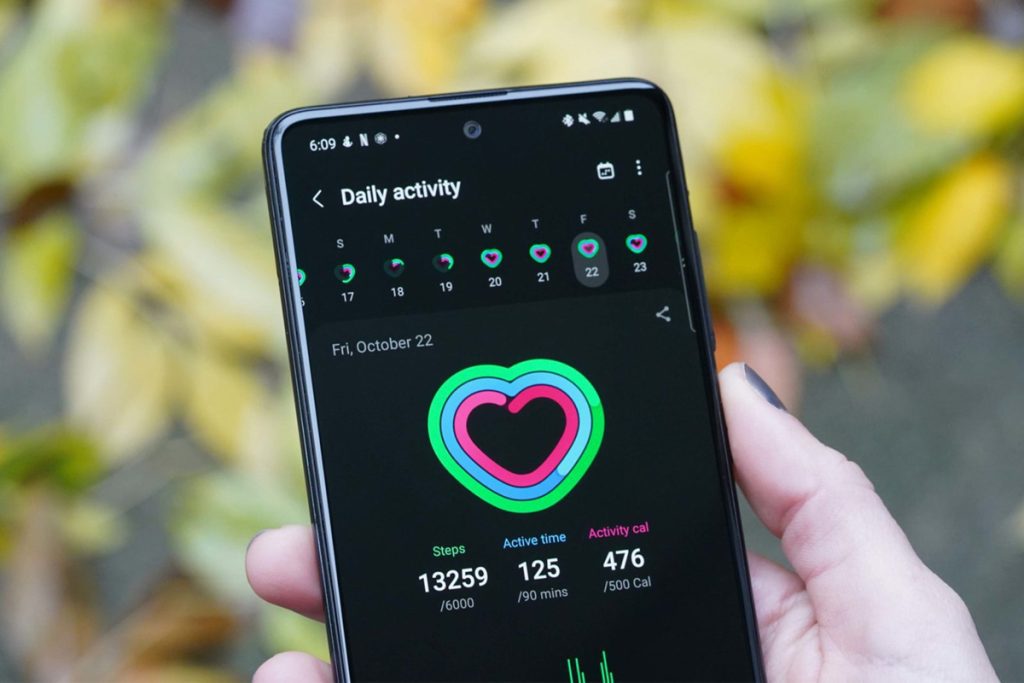
What is Healthcare App Development?
Healthcare app development is a protracted process by which an application is built for desktop or mobile devices.
The intention behind is to help users effectively govern their fitness goals, medical conditions or insurance claims. It also includes appointment management, lab results, doctor prescription and more.
There are a variety of in-demand healthcare apps by healthcare executives; few of them are Health, Fitness Trackers, Hospital and Medical Services, Electronic Health Records, or Insurance Claims.
How to Get Starting to Developing a Healthcare App
1. Identify Right Problem To Be Solved:
Having only a mobile application is not enough in 2022. While the digital world is growing rapidly, market saturation is high so is the users and healthcare solution provider’s expectations.
Look for an absolute solution to the existing pain points of the users and also anticipate problems that might arise in future as well. The app should target your audiences problems and provide a convenient solution for them.
You have to meet the user requirements in order to succeed.
If you have an idea and want to implement it, it’s mandatory to go through the complete user journey. You can get reviews from domain experts in this domain from your circle. Launching a successful application requires the complete fulfilment of all use cases.
You can also invest to find professional healthcare application experts who can also withdraw your attention to use-cases you have not contemplated before.
2. Define Healthcare App Target Patron Group:
Targeting the right audience at the right time makes a business profitable and growing. As we mentioned above, the healthcare industry always grows with comprehensive solutions.
“Approximately 47% of all unsuccessful projects failed to achieve their goals due to poor requirements management.”
Understanding the need and priority of the target group out-turn a perfect end-product. According to Statista, almost 68% of technology startups that are successful match the target audience’s needs.
These types of applications result in a better choice for wide adoption instead of engineering applications based on the hit-and-miss approach.
- Dashboards:
Healthcare apps should have operational, strategic, and analytical dashboards for a better user experience.
- Simplicity:
Design should be creative and unique according to your target audience. Simplicity does not mean it will have some white species between different designed components but a lot.
- Accessibility:
It is one of the crucial features of healthcare apps, as your target patron can be any age group.
Likewise, Keep the user interface concise, bold font size, high and low colors contrast, and more.
- Activity Feed:
To retain the maximum audience, different healthcare apps also focus on gamification, perks, rewards, etc. for a deep-rooted customer-business bonding. Consequently, It results in targeting massive audience groups.
What Features Your Healthcare App Should Have?
Designing a better and feature enriching application is really a crucial task. As we discuss above a little bit about healthcare app features like UX.
It should be informative, innovative, and easy to navigate. Let’s discuss some technical and UI/UX features a robust mobile or desktop application should have.
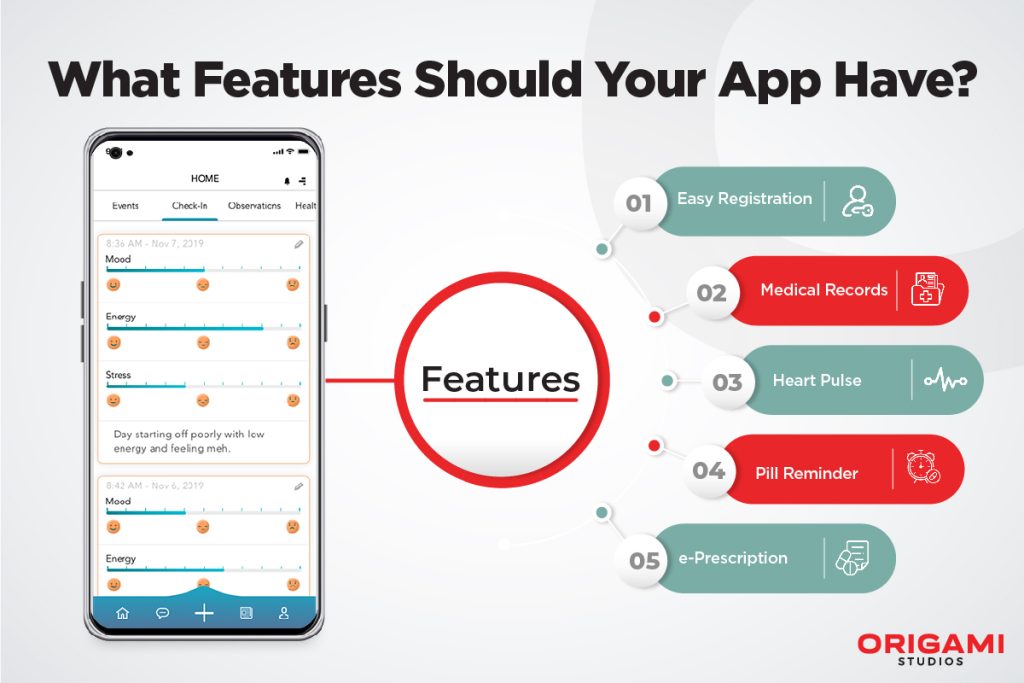
Technical App Features
Before you develop a healthcare app, it should have the following technical features:
Cost-effective:
For your healthcare application development, you can hire an in-house, outsourced or freelancer development team. Yet, the software development process is really extensive and occasionally costs tend to skyrocket.
To get a cost-effective solution, you can hire Origami Studios. We have a team of professional developers who follow DevOps, Adopt an agile methodology, and Automated testing to launch your healthcare app earlier at minimum cost.
Scalable & Robust:
Performance matrices that affect the overall application are scalability and robustness. Scalable healthcare apps grow in terms of complexity, traffic, and data volume while robustness means how this application interacts with different operating systems and platforms. Scalable and Robust is the backbone of any fortunate application over the internet.
Search options:
Creating a better experience for your online app users increases worth. About 47% of mobile application users opt for filterable searches. Consequently, it is also an integral part of the whole application design.
Bright and bold color schemes:
User interaction also plays a vital role in healthcare application success. For online mobile healthcare applications, clients are the direct business.
So, it requires a sophisticated graphical user interface. There’s a wide variety of mobile app color designs namely Analogous, Monochromatic, Triadic, Complementary, and more.
Security:
Compact and completely secured software solutions have their own worth in the digital era. Patching a healthcare app will keep visitors’ and customers’ data confidential like user history, payment card info, digital banking pins, and more. It will turn visitors into customers due to long-term confidence in the app.
User Feedback:
It comes under the umbrella of beta testing. User feedback helps in application functionality, usability, reliability, and compatibility enhancements.
Updates:
The process of instigating new features, and repairing or removing discovered software holes is said to be a system update.
In the software development life cycle, it comes under the maintenance phase where pre-build apps are patched for security flaws or to help protect your data.
Users Features
Before you develop a healthcare app, it should have the following features for users:
Easy Registration and Login:
Your application should have proper sign-up and log-in interfaces to turn your visitors into permanent customers. Easy registration creates a permanent bonding to interact and become a buyer.
Profile Lookup:
If you are making a record-keeping application like healthcare. It is mandatory to have user profile interfaces.
Reminders and notifications: To retain your customer in your business, every so often, it is mandatory to keep updated.
In healthcare, notification plays an important role to keep patients updated about their regular goals. Reminders help them to track their daily progress and psychologically retain them.
Medical Records:
There are a number of mobile health apps that keep their patient records online and keep them updated with their medical physicians or doctors.
Medical record base applications have some analysis dashboards to give data informatics.
Symptom checker: In this revolutionized world, almost every smart healthcare app like mHealth has exceptional features. A symptom check is an AI-based healthcare solution that predicts patient body indexes like temperature.
Heart Pulse Analyzer:
It’s also one of the smart healthcare solutions that predicts patient heart rate, blood pressure and more.
Addons Integration:
It allows you to connect your digital healthcare application to external devices. Addons also enhance the features of healthcare applications resulting in robustness.
How To Develop A Full-Fledged Healthcare App?
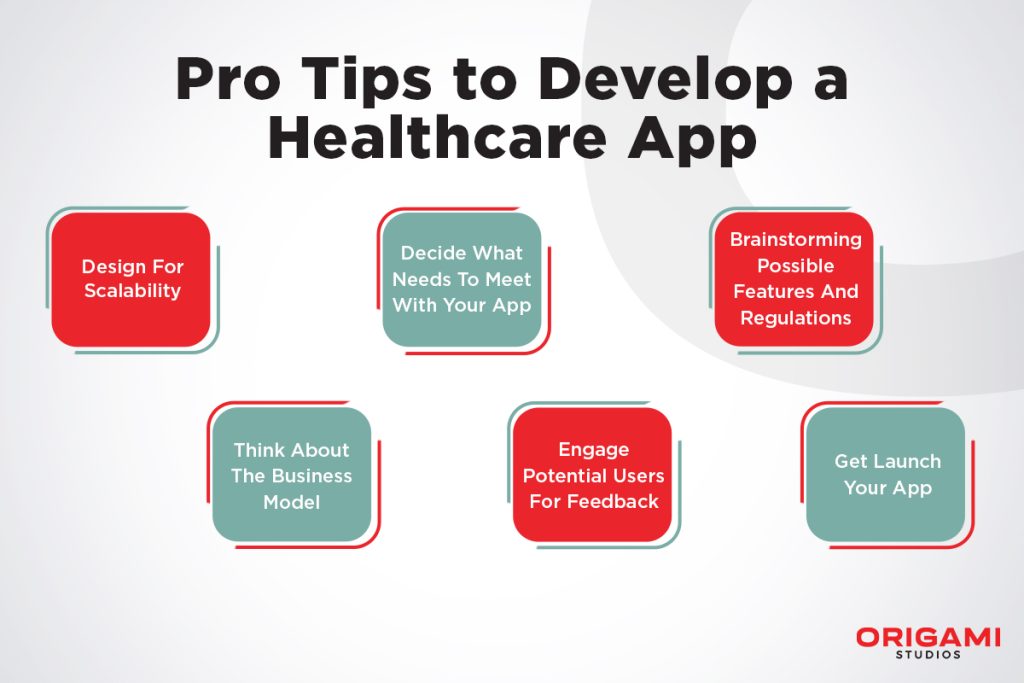
Design For Scalability:
Designing a potential healthcare application is not enough in 2022. Market competition is high so users’ and business owners’ expectations are as well.
Before going to the features of healthcare applications, first, you need to understand your potential audience. Your application should be scalable when high-traffic encounters.
So, to design a healthcare app you need a team of competent people, ping us we are here to assist you.
Decide What Needs To Meet With Your App:
In this step, we are going to discuss what people like to see in your app. Either you are going to design an enterprise healthcare solution or a client-based mobile application.
If you are going to design your own product you must launch your product with a minimum budget and manpower. But keep in mind that your healthcare solution should have enough potential to compete with a gigantic market of 53,054+ apps. To do that our MVP development services are perfect for you.
Brainstorming Possible Features And Regulations:
Skyrocketing features of your mobile application results in more business profit and market worth. Ultimately, visitors have enough confidence to become customers. Always try to add exceptional features as your competitor is selling them at some price.
You can add some of them for free. Creating a healthcare mobile application is not hard but including features and user-friendly app navigation matters. It should have all the technical and user features above mentioned.
Think About The Business Model:
The business model is a company’s core strategy to make a profit which defines the product and services you are going to sell.
The intention behind every mobile application development is to get some reward, be it money or anything. Thus, before going to design an application you should have a plan.
Are you still confused? No sweat! Our healthcare-specialized business experts are always here to assist you. Book your slot to acquire a business model.
Engage Potential Users For Feedback:
To engage maximum audiences you can integrate gamification apps, perks, rewards, and health tips. Potential user attraction to your business model always matters.
You can integrate reminders and notifications addons to market your idea easily. Try to collect targeted user feedback for marketing and application maintenance purposes.
Mostly, healthcare applications are selling medical data to different enterprises for research and innovation.
Launch Your App:
Efforts always pay off, it’s time to launch your flagship product to accomplish your business goals.
Implement your business model and start to get responses from your target customers. But, always listen and iterate through your application maintenance.
Do not compromise on confidentiality, integrity, and availability of your online asset & valued customers.
What are Development Stages to Develop a Healthcare App?
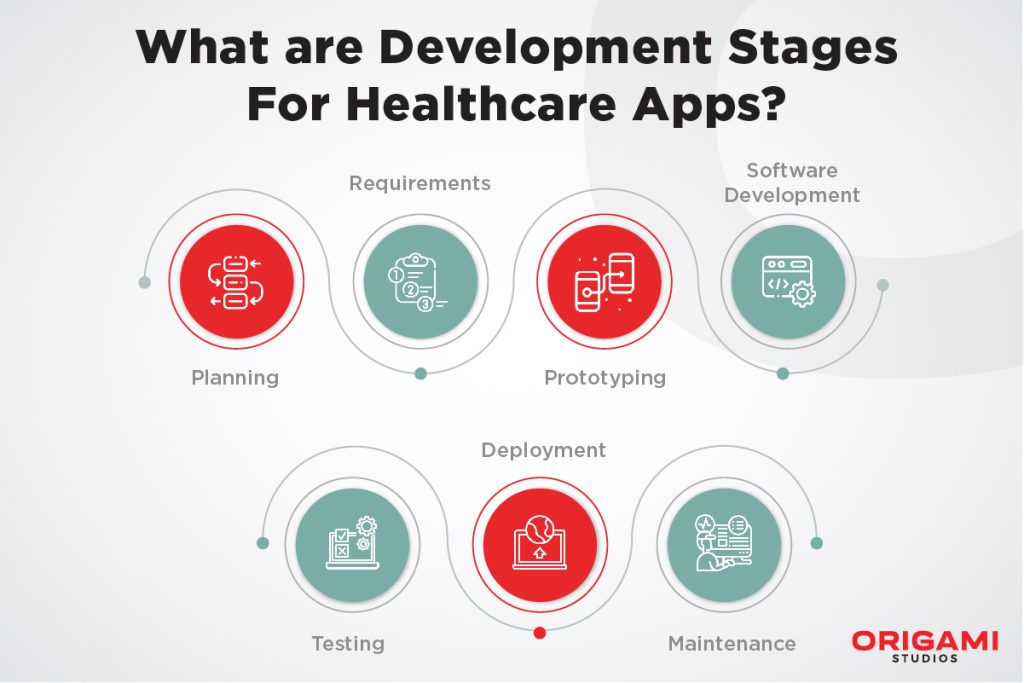
1. Planning:
It is the first basic phase in which healthcare applications are analyzed. Solution architects and medical domain experts sit together and design a strategic plan for the client. Software engineering methodologies are decided to be followed.
2. Requirements:
Moving forward with planning in the software development life cycle. The gathered information is used to plan a strategic project approach as well as feasible scrutiny from technical and functional perspectives.
Requirements are gathered for healthcare solutions like target audience, communication portals, User-friendly design, HIPAA compliance, and more.
3. Designing and Prototyping:
The next phase of SDLC is designing and prototyping your healthcare solution. The major purpose of this phase is to design a basic structural framework according to functional requirements.
Generating a complete road map among significant components of a software solution. At this stage, different types of documents are also designed throughout the whole SDLC process.
It assists to comprehend project goals, functionality allows executive leadership and developers to discuss system requirements.
4. Software Development:
It includes actual software programming or coding different modules designed in the designing and prototyping phase.
This phase is more time, resource, and money-consuming, resulting in costly & challenging.
5. Product Testing:
This phase in SDLC includes quality assurance testing, user acceptance testing, system integration testing, and more.
It helps to test different modules designed during the software development phase. For healthcare apps, testing databases for medical record management, SQL injections, and exception handling are involved.
6. Deployment:
Now, finally, the time comes to deploy a tested healthcare application and put the product into production.
It is a really important stage in the software development cycle as it delivers designers and their team effort as well.
It only includes verification and validation of the delivered software solution.
7. Maintenance:
It includes software feature enhancement, upgrades, technical or security fixes, etc.
**Software documentation is a parallel process in each phase.
If you’re thinking about developing an MVP Healthcare app, you can also read our article on creating a MVP Medical app to know more about development and costs.
What Types Of Healthcare Apps Are There?
There is a wide variety of healthcare solutions out there. Depending on their purpose of use applications are divided into two major categories.
You can go with one out of them for your healthcare app development. Some applications are specifically designed for Doctors and others for patients to track their goals, fitness records etc.
- Professional Health Solutions
- Mobile Health Applications For Patients
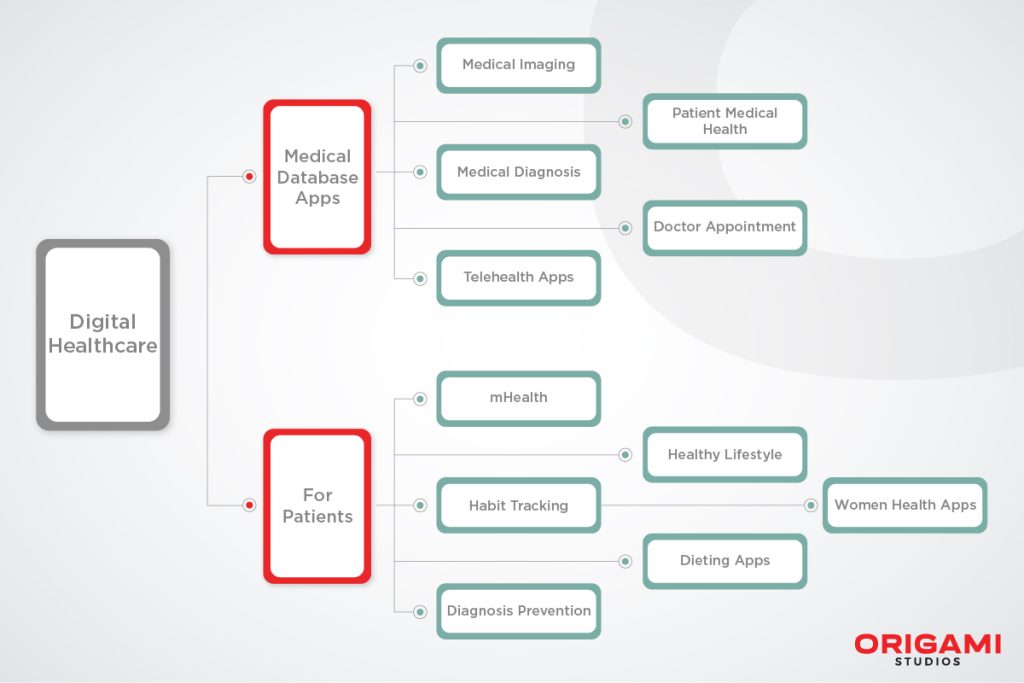
Professional Health Solutions:
Nowadays, there is a wide variety of professional healthcare apps that allows medical centers to keep their patient records and doctors to remotely monitor the health of their patients.
Every healthcare solution has its own multiplex logic to design and complexity of the working model.
Working Model:
Creating a healthcare app for a specific working model is a grinding process. Our healthcare specialized services can help you to build a custom solution. We can divide the business model into subsequent categories.
- mHealth apps
- Telehealth mobile apps
- Medical database apps
- Patient medical health tracking apps
- Doctor appointment/Clinical assistance apps
Revenue Generation:
For medical centers, professional apps assist in revenue generation in two ways.
Directly: Selling patient data to businesses and medical institutes for research.
Indirectly: Analyzing patient demands and escalating business models.
Mobile Health Applications For Patients:
Working Model:
Creating a healthcare app for a specific target audience or community is a grinding process. Our healthcare specialized services can help you to build a custom mobile application solution. We can divide the patient apps into subsequent categories.
- Medical or Health habit-tracking apps
- Diagnosis apps for preventive purposes
Monitoring apps for chronic conditions - Healthy lifestyle & Dieting apps
- Mental health apps
- Women health apps
Revenue Generation:
Healthcare applications for patients have the following revenue generation models.
In-app Advertising: It is one of the famous revenue models for making money online through applications. Developers integrate third-party ads and get paid for serving ads within apps. To do that, they need an ad monetization platform like AdSense to get paid for each impression.
In-App Purchases: In this revenue generation model, the application allows users to buy subscriptions to utilize any service or feature. To make money, the majority of healthcare apps are backing Subscription, Data Monetization, and Freemium models.
Data Monetization: In this revenue model, businesses exchange information of their users like personal information including name, place, and date of birth, to get paid. In 2022, developers are obliged to follow US laws and ethics in order to exchange the information of their users. Anyhow, that’s a separate issue.
Sponsorships: Making money through sponsorships is not easy enough but it still exists. Multinational companies sponsor millions of websites and applications to target their specific audience. In healthcare, medicine or drug selling companies invest a lot every year.
“Worldwide Survey 2017-2025: In 2020, global revenue from mobile apps increased to over 318bn USD. This was an increase of over 60bn USD compared to 2019.” [source: Statista]
How Much Does It Cost to Develop a Healthcare App?

The ultimate cost to create a healthcare app depends on the multiple features, and capabilities it is going to offer.
Before discussing the development cost of Healthcare mobile applications let’s discuss team requirements. To complete a full-fledged flagship product for your startup or online medical business you need:
- Project Manager
- Business Analyst
- DevOps
- Front End Developer
- Back End Developer
- Compliance Expert
- UI/UX Expert
- Quality Assurance Engineer
- Maintenance Engineer (Optional)
Conforming to Research2Guidance analysis, almost 24,000 mobile healthcare agencies are up. The average development cost of healthcare applications is approximately $425,000. Almost 53% of the total cost goes to materials, marketing, administrative costs, licensing, etc.
While the remaining 47% does to development. Moreover, about 36% of startups spend less than $25,000 on their application development, while only 13% had allocated budgets exceeding $500,000.
The summary
Specialized healthcare application development experts are not everywhere. That’s why at Origami Studios, we have a team of experienced developers to kick off your project.
Our mobile application development team and solution architects are always ready to bring your business idea to the next level. We curated these services to support business ideas like yours and launch them into the market with the best healthcare product.
From the market competition to the target audience, Origami Studios has an in-depth understanding of the entire market landscape. Hope you liked our guide to developing a healthcare app in a step-by-step process.